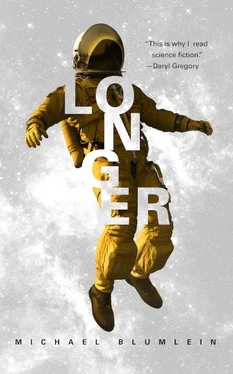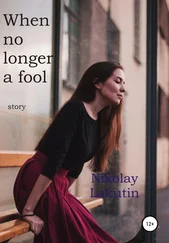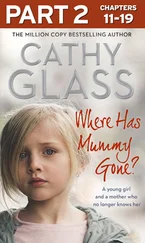Death retreated.
But not far, and not for long.
Eternal darkness was like a fog that might lift for a minute, an hour, a lifetime or two, but in the end would return to engulf all. A fog of oblivion. It sent its lacy tendrils toward him now. They carried the smell of death. An honest smell. Awful, but beguiling.
It filled his nostrils, then his mind.
Death was upon him.
The Ooi refused to yield. It hovered above the asteroid, and seemed to melt. Bubbles appeared on its surface, and as they burst, he smelled something new in the air. Sweet but not too sweet, rich but not too rich. Fresh and deeply satisfying. A smell to put iron in the blood and hair on the tongue. The smell of life, which overwhelmed the smell of death, and silenced the alarm.
But only for a little while.
Like a school bell, signaling the end of recess, it returned. Like a barking dog, it wouldn’t stop.
He was growing weary of the sound. Weary to the bone. He longed for peace and quiet.
He looked to the Ooi for help, but it had nothing more for him, nothing more to give. It had done what it could. He thanked it with all his heart, and wished it well.
The wish was his final thought.
After that, there were only sensations. A roaring in his ears. A pungent, earthy scent. A spreading chill, and something opposing it, the embers of a fire, pale red and ghostly pink, growing ever fainter. He saw a ray of light, felt a spark, then was swallowed by darkness.
Comin’ through today
You know what to do
Go for what you know
You can’t pass it by
Bringin’ it straight to you. [1] From “Comin’ Thru,” by Chali 2na.
Gunjita stood on the banks of the Ganges, near Rishikesh. It was early morning. A light breeze carried the smell of burning wood, bone, and flesh, from an upstream ghat. A snapping turtle, grown thick-shelled on its diet of turtle food and supplemental calcium, was basking on a nearby rock. Downstream was a small sandy beach. Across the river a steep, forested hill gave an inkling of the vast heights beyond it.
The smell stirred a memory. Gunjita had not been an eater of flesh for many long years, not since coming of age, when she’d flexed the muscle of independence, commitment, and fierce belief. A hundred and fifty years a vegetarian. A century and a half grazing, crunching seeds, eating nuts and beans, sipping nectar.
The memory: her dashing, rose-scented father was roasting a goat on a spit. She must have been a girl. She could remember the smell, and the feeling in her mouth, the sudden, uncontrolled salivation, the thickness of her tongue, the aching in her throat. Roasted goat, crispy, savory, and rich. Two lifetimes ago, and she could still taste it.
Two lifetimes, and now she was looking at a third. She felt like a book that kept getting longer, with more chapters, more characters, more drama. The book meandered a bit, but overall stuck to a fairly predictable storyline. It was the book of Gunjita Gharia, thicker, weightier, heftier than ever, but after two lifetimes not much different than it was after one.
The world had changed; the woman only slightly. She hadn’t wanted to change. She liked who she was. More of the same suited her.
This was true of many juvers. Others saw juving as a perfect time to try something new and different.
This did not always go as planned. Newness was one thing to wish for, another to accomplish. The habits of a lifetime, much less two, were not easily broken. Juving was no guarantee.
What it did guarantee: a month of turmoil, upheaval, and chaos, as the body rearranged itself. For most people, a distinctly unpleasant experience. It was a shock to the system, and every part of the system, notably consciousness, unconsciousness, subconsciousness, superconsciousness, and the two other consciousnesses, yet to be announced. She was glad she wouldn’t be facing it again. She understood Cav’s reluctance. But if she could overcome hers, why couldn’t he overcome his? What was she missing?
He wasn’t weak-willed. On the contrary.
Something shiny and bright had robbed him of the big picture.
There was a lesson in this, maybe even intended: the big picture wasn’t the only picture. There were smaller ones. Small did not necessarily mean less valuable or fulfilling.
Parting advice from her ex.
Novelty wasn’t for everyone, but if she wanted to give it a shot, she could start small. Make a modest change.
Goat, strictly speaking, wasn’t new to her. But it was new enough. The prospect engaged and excited her. And why stop there? Humans were naturally omnivorous. Physically, it felt right. Morally, it would bridge the divide in her mind between sacrificing animals routinely in the name of progress and the greater good, and being opposed to their wholesale slaughter for food. Eating meat, if nothing else, would end the hypocrisy.
She could try chicken. Pork. Fish.
Cow meat? Even cow?
Maybe not cow.
She could see Cav raise his eyebrows at this. Not cow? Explain that to me. She could hear him questioning her logic. Not meanly. Never meanly, always in the spirit of clarity and understanding. She’d loved this about him. Maybe one day she’d love it again.
Right now she was furious.
She’d been back nearly a week. On returning, had immediately buried herself in work, where she felt most at home, but her mind wouldn’t stay on task, it kept drifting. After three days she gave up, and booked a flight to Delhi, then a train to Haridwar, then onward to Rishikesh.
The train was fast, solar-powered, and efficient. A new experience for her—not the India of her childhood. Pilgrims crowded it as they always did, as they had buses before trains, and the broad, beaten-earth path before motor vehicles. Rishikesh, holy city since ancient times, magnet for seekers of truth and enlightenment, was a point of departure for her. A launching pad. She’d left it for a life of research and academia, a life of science, which asked the questions she was interested in, the ones that seemed most important. She was a pilgrim, too, no less passionate, devout, and disciplined than other seekers of wisdom, other servants of the truth.
In the early days she returned home regularly. Then irregularly. Then hardly ever. The last time she’d set eyes on the Ganges, save from the space station, where it looked like the Snake of a Thousand Tongues, was what? Twenty years ago? Forty?
The sight of Earth from the space station never ceased to amaze her. She couldn’t get enough of her home planet. Cav, by contrast, couldn’t get enough of outer space. He seemed already to have cut his ties with Earth, even before they lifted off. She should have known. There were signs, but she had discounted them.
She shouldn’t have gone up. She’d been tricked. She hated him for not being honest with her. In their long life together, what other lies had he told?
A young woman, a villager by appearance, made her way to the small stretch of sand downriver. She was barefoot, with an anklet around one ankle and three dots on her chin. She faced the opposite shore, pressed her palms together in Anjali Mudra, and moments later, without prelude, was standing on her head.
Sirasana. The king of the asanas. Unorthodox to do it immediately, at the very beginning of a yoga session, without warming up.
She wore a saffron-colored sari, which didn’t hide her long legs, or rounded bottom, or the sculpted arch of her lower back, or her toenails, which were painted violet. She held the pose seemingly without effort, steady, statuesque.
He’d dumped her, essentially. Not what he said, or believed, but what it was. For some half-baked vision of his, a story he insisted on telling himself, as if dying were a sign of integrity and courage. For that he’d shown her the door, like a guest who’d overstayed her welcome. The message was painfully clear: an eternity without you is better than another lifetime with.
Читать дальше











